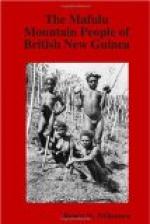[120] Father Egedi thinks that the Lapeka people have some Pokau blood in them. Their language is a mixture of Kuni and Mekeo.
[121] Seligmann’s Melanesians of British New Guinea, p. 16.
[122] Geographical Journal, Vol. XXVI I., p. 235.
[123] Ibid.
[124] Geographical Journal, Vol. XXVII., p. 235.
[125] P. 236.
[126] Ibid.
[127] Geographical Journal, Vol. XXVII., p. 235.
[128] Nature, 9 June, 1910, p. 434.
[129] The Rev. Father Egedi’s Vocabulary of Oru Lopiko gives the pronouns thus:
Singular. Plural.
1st
Person, na, naro. dae, daro.
2nd
Person, ni, niro. ali, alero.
3rd
Person, pi, piro. valo, valoro.
The Possessives are formed with ma: nema, nima, pima, daema, lima, valoma.
The Interrogatives are: tsia? who? itara? vaina? what thing? (S.H.R.)
[130] These numerals differ from the Oru Lopiko of Father Egidi. He gives: konepu, one; kalotolo, two; konekhalavi, three; maimitara, many; onionipu, few. (S.H.R.)
[131] Foot’s joint.
[132] Cf. M. kon(on)de, knot in wood.
[133] Cf. Fire.
[134] Cf. M. tobo, gourd.
[135] Probably introduced. Mekeo avaava, Pokau tavatava, buy.
[136] Introduced. Motu asi.
[137] Cf. M. kon(on)de, knot in wood.
[138] Cf. Fire.
[139] Cf. Finger.
[140] Cf. bag.
[141] Sun its light.
[142] Na, I.
[143] Arm’s joint.
[144] Cf. M. kon(on)de, knot in wood.
[145] Eyebrow’s hair.
[146] Eye-skin.
[147] Nu, thou.
[148] Cf. Branch.
[149] Feneme, eel.
[150] Cf. tala(pe), sp. thread.
[151] Finger’s mother.
[152] Cf. Earth.
[153] Foot’s hollow. Cf. Pumpkin.
[154] Cf. Earth.
[155] Nu, thou.
[156] Hand’s hollow.
[157] _ Ni_, you.
[158] Side’s tongue.
[159] Introduced (Motu, Kimai).
[160] omen, his.
[161] Also handcuffs.
[162] Nu, thou.
[163] To give the breast.
[164] aumen, his?.
[165] Cf. Finger.
[166] Breast, its nose.
[167] Nose, its hole.
[168] Introduced (Kabadi, Motu, bara).
[169] Kabadi, &c., nau.
[170] Sagopalm’s important part.
[171] Na, I.




